
Welcome: Michael Milne
As EMBL’s new Chief Operating Officer, Michael Milne looks forward to building a long-term operational strategy with input from a range of EMBL stakeholders.
PEOPLE & PERSPECTIVES2025
people-perspectives

As EMBL’s new Chief Operating Officer, Michael Milne looks forward to building a long-term operational strategy with input from a range of EMBL stakeholders.
PEOPLE & PERSPECTIVES2025
people-perspectives

EMBL’s 2024 annual report has been published, sharing achievements in its various missions, along with facts and figures from its 50th anniversary year.
EMBL ANNOUNCEMENTS2025
embl-announcements

Estonia may be one of EMBL’s newest member states, but thanks to the Tallinn University of Technology, the Traversing European Coastlines (TREC) project relished not just field sampling and outreach opportunities but also attracted the attention of one of the highest-ranking officials to visit…
CONNECTIONS2025
connections
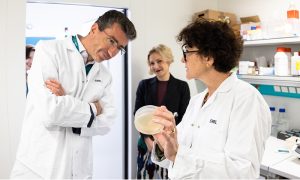
Edith Heard was EMBL’s fifth Director General, but is now moving on to serve as the Francis Crick Institute's Director and Chief Executive Officer. Here, she reflects on her time at EMBL and lessons learned throughout the years.
PEOPLE & PERSPECTIVES2025
people-perspectives

Tara Ocean Foundation’s Executive Director Romain Troublé offers his insights on the TREC project, as part of a new series spotlighting TREC partners.
CONNECTIONS2025
connections
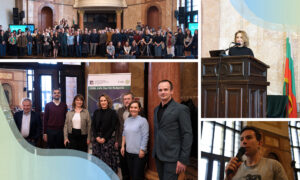
EMBL strengthened its ties with its newest prospect member state Bulgaria at a recent ‘information day’ designed for networking and information exchange.
CONNECTIONS2025
connections

Nobel Laureate May-Britt Moser shares her thoughts on her science, its intrinsic rewards, and what she’ll be talking about in a few weeks at EMBL’s 2025 Kafatos Lecture.
PEOPLE & PERSPECTIVES2025
people-perspectives

This year’s EMBL Corporate Partnership Programme annual meeting connected EMBL scientists with industry representatives to talk about AI and life sciences research.
CONNECTIONS2025
connections

Another EMBL-engineered advance to Brillouin microscopy has significantly widened the aperture to provide quick 3D imaging in real time of light-sensitive samples.
SCIENCE & TECHNOLOGY2025
science-technology

Nobel laureate and neuroscientist May-Britt Moser will discuss how the brain’s grid cells enable navigation and spatial memory at the 2025 Kafatos Lecture.
EMBL ANNOUNCEMENTS2025
embl-announcements

A member of EMBL’s Responsible Research Assessment Working Group shares his thoughts on the importance of reforming strategies to assess research and researchers.
LAB MATTERS2024
lab-matters

Kristaps Krims-Dāvis spent a month at EMBL Heidelberg getting a crash course in cutting-edge microscopy.
CONNECTIONS2024
connections
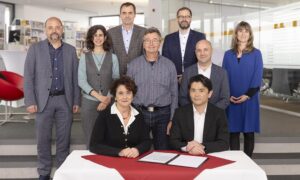
EMBL and Nikon have formally broadened their partnership to accelerate development of next-generation microscopy technologies.
EMBL ANNOUNCEMENTS2024
embl-announcements

Yuvarani Masarapu, a junior bioinformatician and doctoral student at SciLifeLab in Stockholm, spent a week with EMBL collaborators, finding solutions to research challenges and expanding her scientific perspective.
CONNECTIONS2024
connections
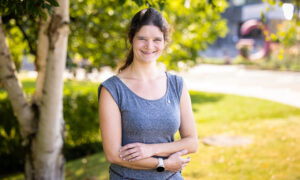
Isabella Graf is EMBL’s newest group leader and the first theoretical biophysicist to join the Developmental Biology Unit.
PEOPLE & PERSPECTIVES2024
people-perspectives
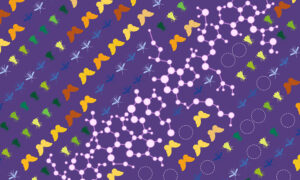
Employing a library of more than 1,000 chemicals, EMBL researchers and collaborators investigated how agrochemicals affect insect populations.
SCIENCE & TECHNOLOGY2024
science-technology

Cell biologist Hans Clevers will discuss organoids as 'avatars' for human organs in research and medicine at the 2024 Kafatos lecture.
PEOPLE & PERSPECTIVES2024
people-perspectives
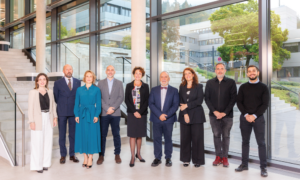
A delegation from Spain’s Ministry of Science, Innovation, and Universities visited EMBL to strengthen ties and discuss future opportunities.
CONNECTIONS2024
connections

An AI-enhanced advanced microscopy approach offers promise in better understanding glioblastomas, one of the deadliest brain cancers.
SCIENCE & TECHNOLOGY2024
science-technology

EMBL scientists applied molecular engineering to build photoacoustic probes to label and visualise neurons deep within brain tissue.
SCIENCE & TECHNOLOGY2024
science-technology

EMBL’s 2023 Annual Report has been published, sharing achievements in its various missions, plus facts & figures from the year.
EMBL ANNOUNCEMENTS2024
embl-announcements

Toby Gibson reflects on 38 years at EMBL, the scientific tools he built along the way, and the state of science today.
PEOPLE & PERSPECTIVES2024
people-perspectives

After 32 years at EMBL – leading a developmental biology research group and later simultaneously serving as EMBL’s Dean for its PhD programme, Anne Ephrussi has retired, ready to start her life’s next chapter.
LAB MATTERSPEOPLE & PERSPECTIVES2024
lab-matterspeople-perspectives

EMBL developmental biologists – with help from other disciplines – pursue the significance of time, timing, and transitions in organisms during their development
EMBLetc2023

EMBL gathered together government, industry, and academic researchers to explore how to leverage the power of AI and machine learning to advance research.
CONNECTIONSLAB MATTERS2023
connectionslab-matters

Elena Conti will discuss how cells control the life and death of mRNA molecules at the 2023 annual Kafatos Lecture on 20 October in Munich.
EMBL ANNOUNCEMENTS2023
alumniembl-announcements

Structural biologist Shlomo Trachtenberg has made research trips to EMBL from Israel since the late 1970s and reflects on the boost EMBL’s technology provided his research, the ingredients for an ideal research institution, and his ongoing fascination with microscopes.
CONNECTIONSLAB MATTERS2023
connectionslab-matters

Sabrina Krueger, scientist-turned-training officer, shares her approach to this role and the need to be ‘true to yourself’.
LAB MATTERSPEOPLE & PERSPECTIVES2023
lab-matterspeople-perspectives

Elena Conti will discuss how cells control the life and death of mRNA molecules at the next annual Kafatos Lecture on 20 October in Munich.
SCIENCE & TECHNOLOGY2023
alumniscience-technology

An upcoming EMBL-led infrastructure management training will help formalise information exchange in the Rhine-Neckar region to widen access to technology and scientific services for members of the Health + Life Science Alliance.
CONNECTIONS2023
connectionsevents

EMBL’s 2022 Annual Report is now available online, including a downloadable ‘Year in Review’.
EMBL ANNOUNCEMENTSLAB MATTERS2023
embl-announcementslab-matters

EMBL will celebrate its 50th anniversary in 2024 with a dynamic scientific symposium. The event will share fundamental research that continues to open the way to scientific discoveries.
EMBL ANNOUNCEMENTS2023
embl-announcementsevents

EMBL Rome alumna Urtė Neniškytė returned to her native Lithuania, helping establish the Vilnius University-EMBL Partnership Institute and advance genome-editing technologies there.
PEOPLE & PERSPECTIVES2023
alumnipeople-perspectives

Sihem Bennour, new head of HR, foresees a deeper culture of information sharing, listening, and problem solving with EMBL staff.
LAB MATTERSPEOPLE & PERSPECTIVES2023
lab-matterspeople-perspectives
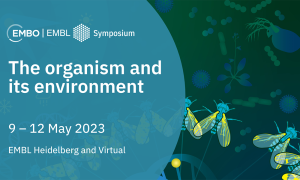
A recent EMBL conference brought together scientists from various disciplines to conjoin scientific pursuits studying ‘life in context’.
SCIENCE & TECHNOLOGY2023
eventsscience-technology
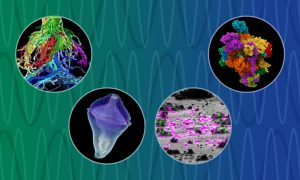
EMBL researchers and collaborators have begun an impactful innovation-development journey, thanks to a European Commission ‘IMAGINE’ grant.
CONNECTIONSLAB MATTERS2023
connectionslab-matters

From biking together while at EMBL to assistant professorships at Heidelberg University, two academics soon formed a union that took them to the United States., into various industry positions, and now to a life with two young children.
PEOPLE & PERSPECTIVES2023
alumnipeople-perspectives
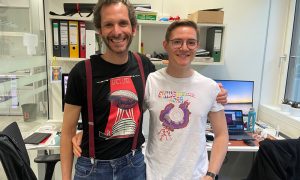
Dey Group holds second annual ‘labbatical’ to step outside daily research tasks with the help of single-celled model organisms.
LAB MATTERSSCIENCE & TECHNOLOGY2023
lab-mattersscience-technology

Vizgen, the life science company dedicated to improving human health by visualising single-cell spatial genomics information, has joined EMBL’s Corporate Partnership Programme.
CONNECTIONSLAB MATTERS2023
connectionslab-matters

Croatian scientists and students from the Ruđer Bošković Institute and University of Zagreb visited EMBL to exchange ideas with researchers and public outreach experts on ways to increase interest, awareness, and involvement in science.
CONNECTIONSLAB MATTERS2023
connectionslab-matters

Alumnus Thomas Graf reflects on his time at EMBL, offering an update on his whereabouts and advice for young scientists.
PEOPLE & PERSPECTIVES2023
alumnipeople-perspectives
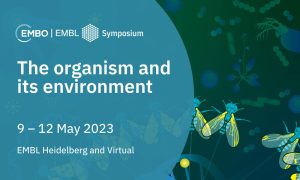
Upcoming EMBO/EMBL symposium provides a forum to explore how organisms function together, and how they react or adapt to changes at different molecular levels.
SCIENCE & TECHNOLOGY2023
eventsscience-technology

Home to some of Europe’s most cutting-edge tools in molecular biology, EMBL has long shared its expertise and access to these tools through an extensive repertoire of courses, conferences, seminars, and other training. And now included in this mix is a job shadowing programme at EMBL Imaging…
LAB MATTERSSCIENCE & TECHNOLOGY2023
lab-mattersscience-technology
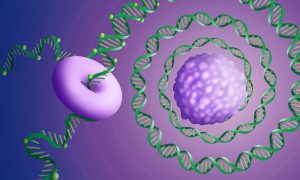
Using Oxford Nanopore long-read sequencing, EMBL scientists sequenced a primary childhood brain tumour known as a medulloblastoma, uncovering a novel complex mutation pattern.
2023
science

An annual Corporate Partnership Programme meeting provided a forum for EMBL researchers and industry representatives to discuss mobile labs, planetary biology, and other areas of common interest.
CONNECTIONS2023
connectionsevents

Group Leader Hanh Vu studies ‘immortal’ flatworms that can grow and de-grow to understand better factors that determine organisms’ sizes.
LAB MATTERSPEOPLE & PERSPECTIVES2023
lab-matterspeople-perspectives
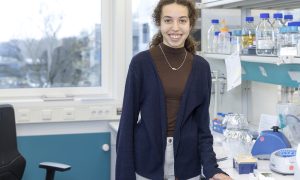
A recent student visitor shares her impressions from visiting EMBL’s Vincent group as we recognise International Day of Women and Girls in Science.
LAB MATTERS2023
lab-matters
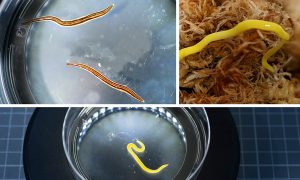
Tasmanian flatworms add to an EMBL researcher’s collection as she studies principles that control animal body size.
LAB MATTERSSCIENCE & TECHNOLOGY2023
lab-matterspicture-of-the-weekscience-technology

EMBL’s EIPOD-Learning in Context programme focuses on interdisciplinary research that explores ‘life in context’ and adds a new collaborative dimension with member state organisations.
EMBL ANNOUNCEMENTSLAB MATTERS2022
embl-announcementslab-matters

Looking to understand microbial predator-prey relationships, EMBL’s newest group leader tackles a molecular ‘arms race’ in his lab.
LAB MATTERSPEOPLE & PERSPECTIVES2022
lab-matterspeople-perspectives
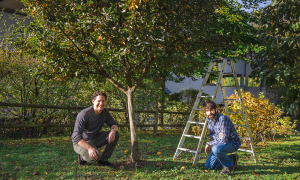
EMBL research groups apply molecular biology and its research tools to better understand agricultural pesticides
EMBLetc2022

Newts act as model organisms for Maria Tosches, winner of the 2022 John Kendrew Award, to further explore the cellular makeup of vertebrate brains.
EMBLetc2022
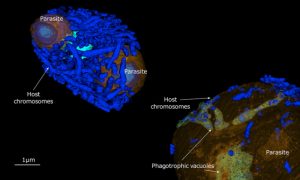
Plankton parasites provide a zombie story perfect for Halloween. While invading single-celled plankton, these parasites devour the cell’s nucleus and hijack metabolism while the organism remains alive.
2022
science

After a postdoc at Weizmann Institute of Science in Israel, Flora Vincent has joined EMBL’s Developmental Biology unit to further explore the world of phytoplankton.
LAB MATTERSPEOPLE & PERSPECTIVES2022
lab-matterspeople-perspectives
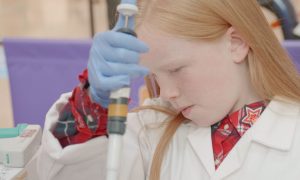
EMBL reminds teachers of freely available educational resources and workshops just in time for school.
LAB MATTERS2022
lab-matters
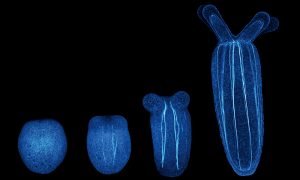
The latest research from EMBL’s Ikmi group employs interdisciplinary approaches to show how sea anemone ‘exercise’ changes their developing size and shape, uncovering an intimate relationship between behaviour and body development
SCIENCE & TECHNOLOGY2022
sciencescience-technology

As the career landscape continues to change for PhDs and postdocs, the EMBL Fellows’ Career Service offers webinars that present professional options in and beyond academia.
LAB MATTERS2022
eventslab-matters

The Scientific Visitor Programme shares EMBL tools and talent with outside researchers in collaborative, multidisciplinary environments.
LAB MATTERS2022
lab-matters

A new grant will provide a way for fundamental metabolomic research to realise its commercial potential and promise in aiding drug development and precision medicine.
LAB MATTERSSCIENCE & TECHNOLOGY2022
lab-mattersscience-technology
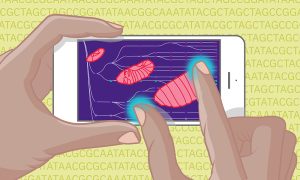
EMBL and UW researchers plus additional collaborators have constructed a complete map of fruit fly embryonic development using machine learning. This research is foundational to better understanding overall embryo development in other species, including humans.
SCIENCE & TECHNOLOGY2022
sciencescience-technology

EMBL’s new archive and records manager, Maria Papanikolaou, explains the dual role she and an additional colleague will have in the Office of Science Information Management.
LAB MATTERSPEOPLE & PERSPECTIVES2022
lab-matterspeople-perspectives

EMBL researchers now understand the function of an elusive small DNA in bacteria and have developed a tool that can be used to better understand what might ‘switch on’ bacterial immune defences.
SCIENCE & TECHNOLOGY2022
sciencescience-technology
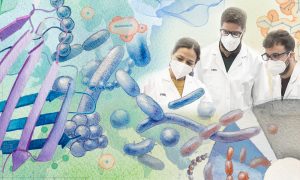
EMBL’s 2021 Annual Report is now available, sharing mission highlights from the year in a new digital-first, sustainable format.
EMBL ANNOUNCEMENTSLAB MATTERS2022
embl-announcementslab-matters
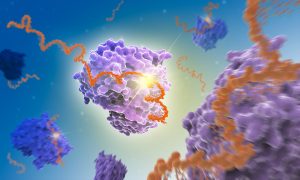
EMBL research with Enolase 1 (ENO1) points to a possible new way to understand RNA’s leading role in how cells develop.
SCIENCE & TECHNOLOGY2022
sciencescience-technology

A new formal collaboration agreement enables will help smooth the transition from fundamental science to innovation.
CONNECTIONSLAB MATTERS2022
connectionslab-matters
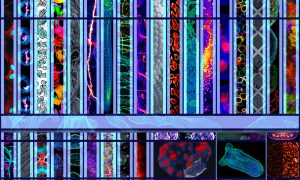
EMBL’s first Imaging Centre Symposium will occur onsite at EMBL and include tours of the new Imaging Centre on 31 May, introducing participants to the facility and its staff and featuring talks on the rapid developments in imaging technologies that have led to notable biological and medical…
EMBL ANNOUNCEMENTS2022
embl-announcementsevents

EMBL hosted a futuristic infection biology conference, but it offered even more: an opportunity for postdocs to share their work and network towards future research homes.
LAB MATTERS2022
eventslab-matters

New study: EMBL PhDs and postdocs develop skills that make them highly employable in roles that drive research and innovation in academia, industry, and other sectors.
LAB MATTERS2022
alumnilab-matters

Michael Dorrity, one of EMBL’s newest group leaders, is studying how the environment influences early life stages in zebrafish.
LAB MATTERSPEOPLE & PERSPECTIVES2022
lab-matterspeople-perspectives
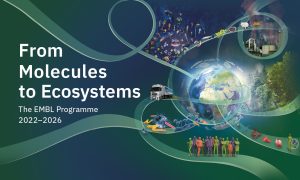
EMBL announces details about its next programme, ‘Molecules to Ecosystems’. It will guide studying life across scales and in context with changing environments.
EMBL ANNOUNCEMENTSLAB MATTERS2022
announcementsembl-announcementslab-matters
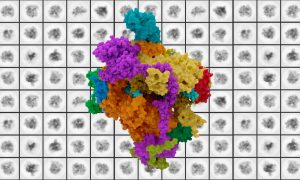
New structural biology research provides fundamental information critical to understanding enzyme mutations connected to rare diseases and cancers.
SCIENCE & TECHNOLOGY2021
sciencescience-technology

Using gene editing and three types of microscopy, one of EMBL’s newest group leaders is deciphering the functions of one of the smallest molecules involved in cell division, motility, and signalling, known as a centriole.
LAB MATTERSPEOPLE & PERSPECTIVES2021
lab-matterspeople-perspectives

Maria Zimmermann-Kogadeeva is one of EMBL’s newest group leaders and a computational biologist whose research group applies computational modelling to better understand the metabolism of gut bacteria and their potential to have far-reaching impacts on other organs.
LAB MATTERSPEOPLE & PERSPECTIVES2021
lab-matterspeople-perspectives
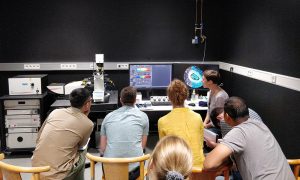
EMBL's PhD and postdoc programmes evolve to the more multidisciplinary way of doing great molecular biology research.
LAB MATTERS2021
lab-matters

Svetlana Dodonova is one of EMBL's newest group leaders, leading a team of researchers who will study how genetic material is organised inside cells using structural biology approaches.
LAB MATTERSPEOPLE & PERSPECTIVES2021
lab-matterspeople-perspectives
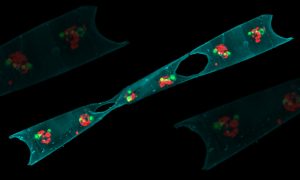
A technology around since the ‘60s, flow cytometry has increasing applications. New leadership at EMBL’s flow cytometry facilities is looking to ease use, expand training, and encourage more collaboration.
LAB MATTERSSCIENCE & TECHNOLOGY2021
lab-mattersscience-technology

If researchers can identify specifically when good cells go bad, they can potentially understand disease better.
SCIENCE & TECHNOLOGY2021
sciencescience-technology
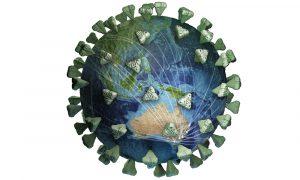
EMBL will host a conference to look at the state of the pandemic, lessons learned, and ways to improve pandemic preparedness. Here’s a sneak peek into what promises to be another interesting and informative EMBL conference.
SCIENCE & TECHNOLOGY2021
eventsscience-technology

A research collaboration used machine learning to map tumour molecular make-up, potentially paving way to more customised cancer treatment.
SCIENCE & TECHNOLOGY2021
sciencescience-technology
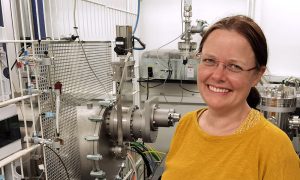
EMBL’s Melissa Graewert and colleagues are taking a structural biologist’s approach to better understanding nanoplastic particles.
SCIENCE & TECHNOLOGY2021
sciencescience-technology

Anna Erzberger, one of EMBL’s newest group leaders, will provide unique perspective as a theoretical biological physicist.
LAB MATTERSPEOPLE & PERSPECTIVES2021
lab-matterspeople-perspectives

At an EMBL Science & Society lecture, science journalist Kai Kupferschmidt advocated for accurate, clear and contextual science communication.
PEOPLE & PERSPECTIVES2021
eventspeople-perspectives

After work in antimicrobial resistance, EMBL postdoc Laura Carroll is using machine learning for next-gen antibiotic development.
PEOPLE & PERSPECTIVES2021
people-perspectivesscience
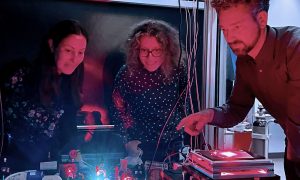
EMBL group leaders Julia Mahamid, Anna Kreshuk & Jonas Ries awarded Chan Zuckerberg Initiative grant to advance what we see inside cells.
LAB MATTERSPEOPLE & PERSPECTIVES2021
lab-matterspeople-perspectives
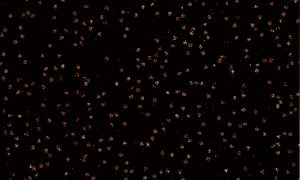
As perfect as a summer night sky, these nuclear pores help calibrate a customised super-resolution microscope in EMBL’s Ries group.
SCIENCE & TECHNOLOGY2021
picture-of-the-weekscience-technology

EMBL’s EU Green Week event showcased various ways molecular biology research can help solve environmental challenges.
LAB MATTERS2021
lab-matters

EMBL’s most recent Science and Society seminar explored how best to harness big data to address multi-faceted issues of a pandemic.
CONNECTIONS2021
connectionsevents

The Gesellschaft für Biochemie und Molekularbiologie has awarded a FEBS Anniversary Prize to Michael Zimmermann for his gut microbiome research.
EMBL ANNOUNCEMENTSLAB MATTERS2021
embl-announcementslab-matters
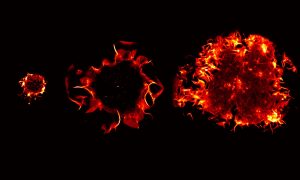
The EMBL Picture of the Week features a series of Jurkat T cells during different stages of the activation process.
SCIENCE & TECHNOLOGY2021
picture-of-the-weekscience-technology

EMBL scientists have combined artificial intelligence (AI) algorithms with two cutting-edge microscopy techniques.
SCIENCE & TECHNOLOGY2021
sciencescience-technology

Zehra Sayers explains what makes the SESAME synchrotron special, why we should not fear failure, and why curiosity is her biggest driver.
PEOPLE & PERSPECTIVES2021
alumnipeople-perspectives
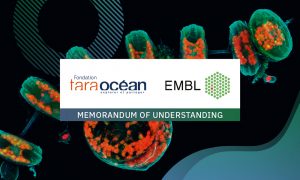
The EMBL-Tara Ocean Foundation collaboration will expand opportunities to jointly explore molecular connections between ocean and humankind.
EMBL ANNOUNCEMENTSLAB MATTERS2021
embl-announcementslab-matters

EMBL Director General Edith Heard has been elected into the US National Academy of Sciences, recognising her contributions to research.
EMBL ANNOUNCEMENTSLAB MATTERS2021
embl-announcementslab-matters
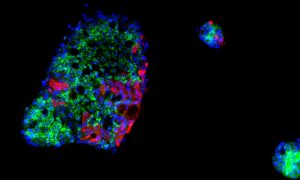
EMBL scientists, together with collaborators from Heidelberg University, have provided further evidence of the gut’s role in COVID-19.
SCIENCE & TECHNOLOGY2021
sciencescience-technology
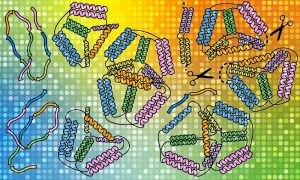
Using EMBL Hamburg’s world-class structural biology infrastructure, researchers advance the folding of protein ‘origami’ designed in the lab.
SCIENCE & TECHNOLOGY2021
sciencescience-technology

EMBL alumnus Kai Simons did early work with Semliki Forest virus membranes, which is now central to a COVID-19 vaccine.
SCIENCE & TECHNOLOGY2021
alumniscience-technology

EMBL alumnus Pawel Masiewicz has transferred skills and experience gained at EMBL to oversee starting materials for mRNA vaccine development.
PEOPLE & PERSPECTIVES2021
alumnipeople-perspectives

Tracey Brown from Sense about Science shares her thoughts on the need to empower women to share and access scientific information.
LAB MATTERS2021
lab-matters

As one of EMBL’s newest group leaders, Sinem Saka will combine multiple technologies, such as microscopy and single-cell omics, to solve biological puzzles.
LAB MATTERSPEOPLE & PERSPECTIVES2021
lab-matterspeople-perspectives

Being a woman in science takes allies, not just great science. Here, EMBL’s L’Oréal–UNESCO Fellows talk about support networks.
LAB MATTERS2021
lab-matters

EMBL Teen Maria-Theresa Licka shares how female scientists guided & inspired her to develop an app to ID vine disease.
LAB MATTERS2021
lab-matters
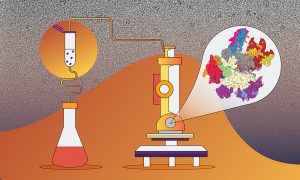
New EMBL research shows where & to what degree a component of cellular machinery known as RNA Pol III is mutated and becomes problematic.
SCIENCE & TECHNOLOGY2021
sciencescience-technology

The EMBL Imaging Centre is scheduled to open in 2021 with Timo Zimmermann as Team Leader for advanced light microscopy technology development and service provision.
LAB MATTERSPEOPLE & PERSPECTIVES2021
lab-matterspeople-perspectives

One of EMBL’s newest group leaders, Olivier Duss, will explore how RNA folds into functional structures and how it works with proteins to control a diverse range of activities in the cell.
LAB MATTERSPEOPLE & PERSPECTIVES2021
lab-matterspeople-perspectives
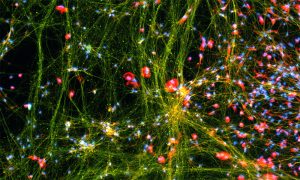
Fluorescent dyes light up a cellular community of neurons and brain immune cells (microglia), which were derived from stem cells.
SCIENCE & TECHNOLOGY2021
picture-of-the-weekscience-technology
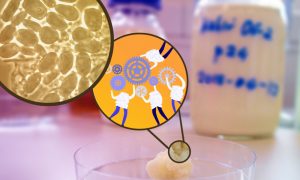
Researchers discovered the dominant species of bacteria in kefir grains cannot endure without other species that help the 'team' survive.
SCIENCE & TECHNOLOGY2021
sciencescience-technology

Facilitated by EMBL’s Scientific Visitor Programme in 2019, Silvia Dias Almeida spent a year in the Diz-Muñoz group, helping solidify her career plans and set her up for a competitive PhD programme in biomedical imaging.
EMBL ANNOUNCEMENTSLAB MATTERS2020
embl-announcementslab-matters

While cryo-electron tomography (cryo-ET) was first envisioned in 1968, the advances the Mahamid group are bringing to this 3D method for studying molecules directly inside cells are new, and are likely to greatly expand its use.
SCIENCE & TECHNOLOGY2020
sciencescience-technology
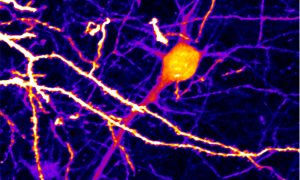
The Chan Zuckerberg Initiative has recognised four EMBL researchers with their most recent awards, showing how tech trailblazers are integral to advancing science and medicine.
EMBL ANNOUNCEMENTSLAB MATTERS2020
embl-announcementslab-matters
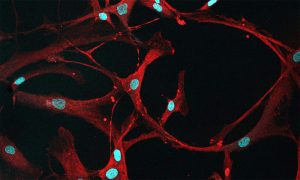
Studying cancers means also knowing what healthy cells look like. In this case, mesenchymal stromal cells (MSCs) from healthy bone marrow are a bit ‘loopy’.
SCIENCE & TECHNOLOGY2020
picture-of-the-weekscience-technology
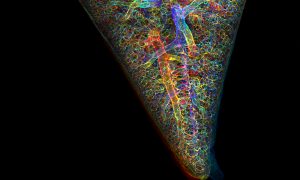
Ever-evolving technology and related budgetary, regulatory, and management challenges prompted EMBL to establish its new ARISE fellowship programme, which begins accepting applicants in December.
LAB MATTERS2020
lab-matters
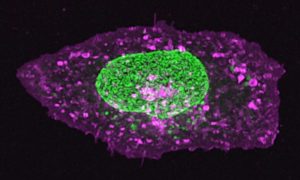
The nucleus of this cell fluoresces in bright green thanks to GFP-labelled nucleoporin proteins. EMBL scientists use engineered nucleoporins as 3D reference standards to improve super-resolution microscopy.
SCIENCE & TECHNOLOGY2020
picture-of-the-weekscience-technology

EMBL and CIML have signed a memorandum of understanding that will open up new scientific opportunities.
CONNECTIONSLAB MATTERS2020
connectionslab-matters
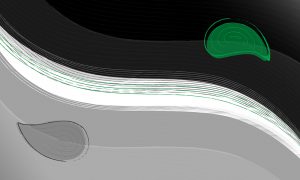
A three-day virtual conference, ‘Gender Roles and their Impact in Academia’, explored how biology, social structures, and unconscious bias shape gender roles, and discussed ways to achieve equal opportunities for men and women in academia.
LAB MATTERS2020
eventslab-matters
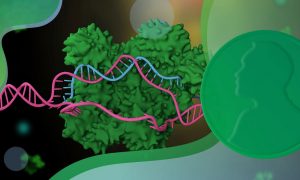
The genome editing tool CRISPR–Cas9 – which plays a critical role in EMBL’s research – was recognised by the Nobel Prize in Chemistry.
SCIENCE & TECHNOLOGY2020
sciencescience-technology
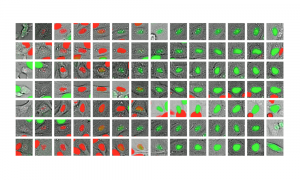
Members of an EMBL-led research group with collaborators in Estonia and Russia have built and trained a deep learning model to better understand how cells grow and divide.
SCIENCE & TECHNOLOGY2020
sciencescience-technology
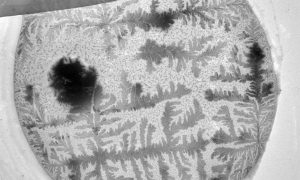
How does your crystal garden grow? EMBL's Electron Microscopy Core Facility was able to capture this garden of blooming crystals as they studied mosquito reproductive cells.
SCIENCE & TECHNOLOGY2020
picture-of-the-weekscience-technology
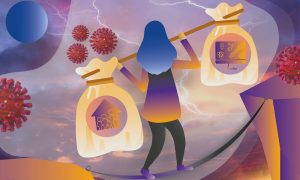
The EMBL conference that explored direct and indirect impacts from the current pandemic on women in science allowed for information and story sharing both in the form of lectures but also via online platforms like Slack and social media that included Twitter.
LAB MATTERS2020
eventslab-matters
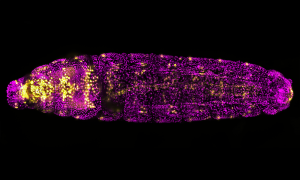
Not just another pretty fruit fly. This magenta and golden drosophila larva is lit up with a fluorescent molecule to help researchers study heart formation.
SCIENCE & TECHNOLOGY2020
picture-of-the-weekscience-technology
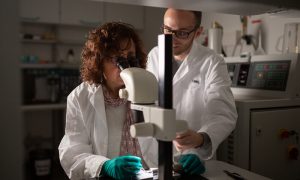
ARISE fellowships to offer first-ever comprehensive training for bioscience infrastructure operations
LAB MATTERS2020
lab-matters
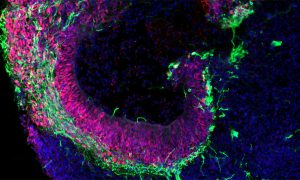
A decadal roadmap points the way to cell-based medicine for Europe
LAB MATTERSSCIENCE & TECHNOLOGY2020
lab-mattersscience-technology
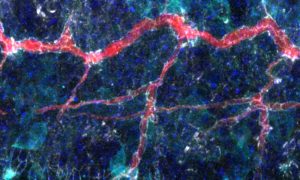
While this may seem like a nebula made up of interstellar clouds of dust and ionised gases, this image isn’t of a galaxy beyond the Milky Way.
SCIENCE & TECHNOLOGY2020
picture-of-the-weekscience-technology
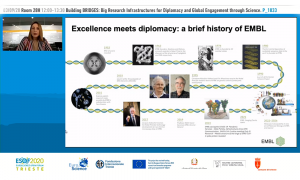
Two EMBL speakers gave presentations that looked toward the future and at ways to trailblaze on the endless frontier of science.
CONNECTIONSLAB MATTERS2020
connectionslab-matters

As the EMBL Fellows' Career Service program reaches a milestone, it reflects on its first year and looks forward to ways to improve its offerings to EMBL postdocs and predocs.
EMBL ANNOUNCEMENTSLAB MATTERS2020
embl-announcementslab-matters
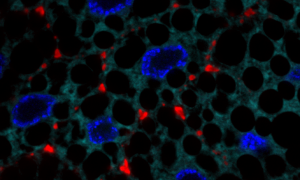
Those heart-shaped cells aren't just for show. They help tell the story of two proteins working together
SCIENCE & TECHNOLOGY2020
picture-of-the-weekscience-technology
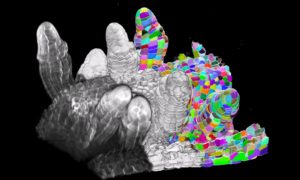
Starting with computer code and moving on to a more user-friendly graphical interface called PlantSeg, the Kreshuk Group at EMBL and collaborators built a simple open-access method to provide the most accurate and versatile analysis of plant tissue development to date.
SCIENCE & TECHNOLOGY2020
sciencescience-technology

More than 500 people have registered for an EMBL conference, "The impact of the COVID-19 crisis on women in science: Challenges and solutions." Scheduled for 9 September, the conference is free and open to all. Pre-registration is still available and required to attend.
SCIENCE & TECHNOLOGY2020
eventsscience-technology
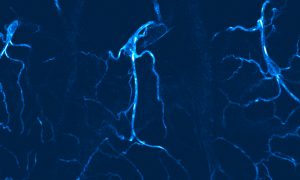
Beautiful flashes of blue colour help light the way for researchers to study cells in fruit fly larva that provide oxygen to tissues.
SCIENCE & TECHNOLOGY2020
picture-of-the-weekscience-technology
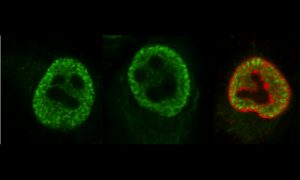
Despite their ghostly appearance, these are very real cell nuclei infected with Influenza A virus – the only influenza virus known to cause pandemics.
SCIENCE & TECHNOLOGY2020
picture-of-the-weekscience-technology
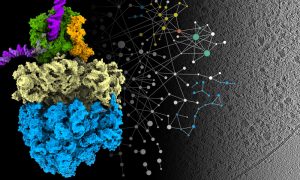
A new approach that allows researchers to see molecular machinery at work inside cells has offered a deeper understanding of how bacteria produce proteins and a unique glimpse into how they respond to antibiotics.
SCIENCE & TECHNOLOGY2020
sciencescience-technology
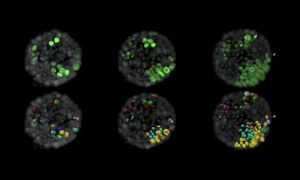
EMBL scientists have created a new, realistic 3D testbed that could help achieve the goal of stopping cancers before they start by studying cancer cells as they first form.
SCIENCE & TECHNOLOGY2020
sciencescience-technology
No matching posts found